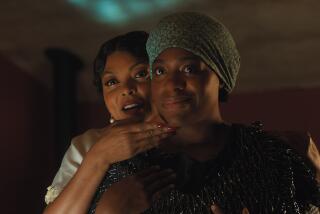Review: Male rivalry anchors the elegant chamber piece ‘Chevalier’
- Share via
The opening moments of “Chevalier,” Athina Rachel Tsangari’s poker-faced comedy of male misbehavior, unfold with near-wordless economy. After an afternoon of diving and fishing, five men emerge from the Aegean Sea, looking almost interchangeable in their dark wetsuits. With a sixth man who has been watching from the shore, they make their way to a nearby yacht, where they climb aboard and help one another peel off their gear — an unforced metaphor for the spectacle of bared flesh and under-the-skin intimacies to come.
Elegantly directed by Tsangari from a script she wrote with Efthymis Filippou (“The Lobster”), the film takes its title from a signet ring that becomes a coveted emblem of superiority — the grand prize in an impromptu six-man tournament called “The Best in General.” Cooked up during a night of too much wine and testosterone, this game will pit these well-to-do men against one another in a series of ridiculous yet revealing contests: Who can polish silver the fastest? Who has the best sleeping posture? The lowest cholesterol levels? The most generous endowment? Yes, “Chevalier” goes there. In this many-sided study of masculine vanity and insecurity, it’s scarcely the most egregious example of hitting below the belt.
Set almost entirely aboard the yacht over a fateful few days and nights, the film is a dockside chamber piece — an accomplished feat of filmmaking in close quarters. It couldn’t have been easy for cinematographer Christos Karamanis to negotiate the camera below deck, and he makes the most of the setting and its tight, shadowy confines. Early on, the extreme widescreen images — full of strategically lopped-off heads and carefully positioned mirrors — serve at once to clarify and confound our understanding of who’s who. It’s a clever reminder that, when it comes to a subject as broad and elastic as gender, generalities can be every bit as revealing as specifics.
Yet even as Tsangari plays deftly with disorientation and claustrophobia, she pries open a window onto something rich, strange and undeniably authentic about male egos in conflict. The film takes its time bringing the characters into focus: We learn what their names are and how some of them are connected, though not exactly how and why they came to spend a holiday together. The oldest among them is a well-mannered doctor (Yorgos Kendros) in his 60s. The youngest is Dimitris (Makis Papadimitriou), a pudgy misfit tagging along on the expedition with his tetchy older brother, Yannis (Yorgos Pirpassopoulos).
Rounding out the group are the handsome, confident Yorgos (Panos Koronis), the odds-on favorite to win; his somewhat easily riled business partner, Josef (Vangelis Mourikis); and Christos (Sakis Rouvas), a handsome brooder who’s nursing a rivalry with someone else on board. Next to these superior specimens, Dimitris seems destined to finish dead last.
He is and he isn’t. Availing herself of some spare yet effective soundtrack choices (Minnie Riperton’s “Lovin’ You” is a particular standout), Tsangari sees the heroism beneath Dimitris’ hapless exterior as clearly as she perceives the cracks in the others’ facades. She takes care to apportion the viewer’s sympathies evenly across the board, even while making it clear that sympathy and identification are not really the point here. The men, though sharply individuated, are held at arm’s length in a picture that — a furious climactic argument notwithstanding — maintains a rigorously cool emotional temperature. This could be the driest movie ever made entirely at sea level.
That coolness isn’t just a tonal decision. It’s a function of the genteel, upper-class civility that governs all but the men’s most heated interactions, insulating them from the bloody warfare that might have erupted in a different social context — or, perhaps, in the hands of a different filmmaker. (Observing and participating from the sidelines are the boat’s all-male staff, who enact a messier, pettier version of “The Best in General” in their own cramped quarters.)
Since it premiered at the Locarno Film Festival last August, “Chevalier” has been subjected to the usual battery of guesses and interpretations as to what it’s all about, possibly because of its author’s unusually inscrutable motives. Is Tsangari, whose “Attenberg” (2010) marked her as one of the most promising exponents of the new wave in Greek cinema, offering up an oblique commentary on her country’s financial and political woes? What does her perspective, as the lone female voice in this all-male configuration, signify?
In interviews and public appearances, the director has declined to specify. For all the mysteries it chooses to leave off screen and on dry land, “Chevalier” speaks for itself: Scene by scene, it builds a vision of group dynamics as calm, violent and finally unyielding as the sea.
------------
‘Chevalier’
MPAA rating: Unrated
Running time: 1 hour, 45 minutes
Playing: In limited release
More to Read
Only good movies
Get the Indie Focus newsletter, Mark Olsen's weekly guide to the world of cinema.
You may occasionally receive promotional content from the Los Angeles Times.








